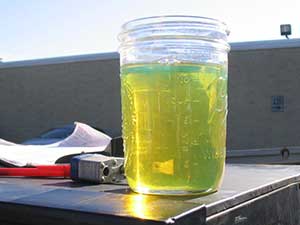
Problem: Seasonal Changes
Why are seasonal issues a concern?
When fuel is cooled below its cloud point temperature, solid wax particles form and can clog filters and engine parts. Similarly, water suspended or dissolved within the fuel can freeze at low temperatures creating clogging ice crystals. We have also found that winter diesel may contain additives that increase water solubility. In warmer weather, bio-growth is more apt to be an issue. And higher humidity can increase the chance of water entering the storage unit.
How do I identify a problem?
When fuel is cooled below its cloud point temperature, it will look cloudy and be more viscous. Ice crystals suspended in the fuel will also make the fuel look cloudy or hazy.
How do I account for seasonal changes?
Use the appropriate fuel for the season. Use winter diesel when temperatures start to decline (October or November) and transition to summer diesel during the warmer months (March or April).
Call Walden to ensure that you’re all set for the change in weather!
Have a comment about how you stay on top of proper diesel fuel practices? Leave it below. We’d love to hear about it!
